Have you been trying to figure out efficient, easy ways to drive more traffic to your blog? You are at the right place.
Blogs emerged in the early 2000s, and have evolved to become valuable and great marketing tools. However, acquiring readers has always been the most significant challenge for most bloggers.
You might have great content on your blog, but yet no meaningful traffic.
Traffic, in the simplest sense, is the average number of visits your blog receives over, say, a month. it could also be a week, day, hour, etc.
You need to keep driving quality traffic to your blog to seem tangible results. The reason is that the more traffic your blog receives, the more revenue you will make.
There are two major ways to grow your blog’s traffic: organically and via paid ads. While the former requires time, patience, and lots of effort, the latter, mostly, requires money.
Today, we’ll go over those that only need your time and effort. If you’ve been struggling to grow your traffic organically, this post is for you.
In this article, you’ll learn about the best ways to increase your traffic, organically. We will go through 30 strategies that you can implement right away to drive more traffic to your blog.
1. Determine Your Target Audience
The importance of defining your niche and determining your target audience is that it gives you an idea of the type of content to create, as well as the tone and language to use. It helps you identify the type of people who’d be interested in your content and your brand.
Once you determine who your target audience is, it will be easier for you to create content that connects with them.
Thankfully, Adoric makes it easy for you to segment your audience and target them with personalized campaigns.
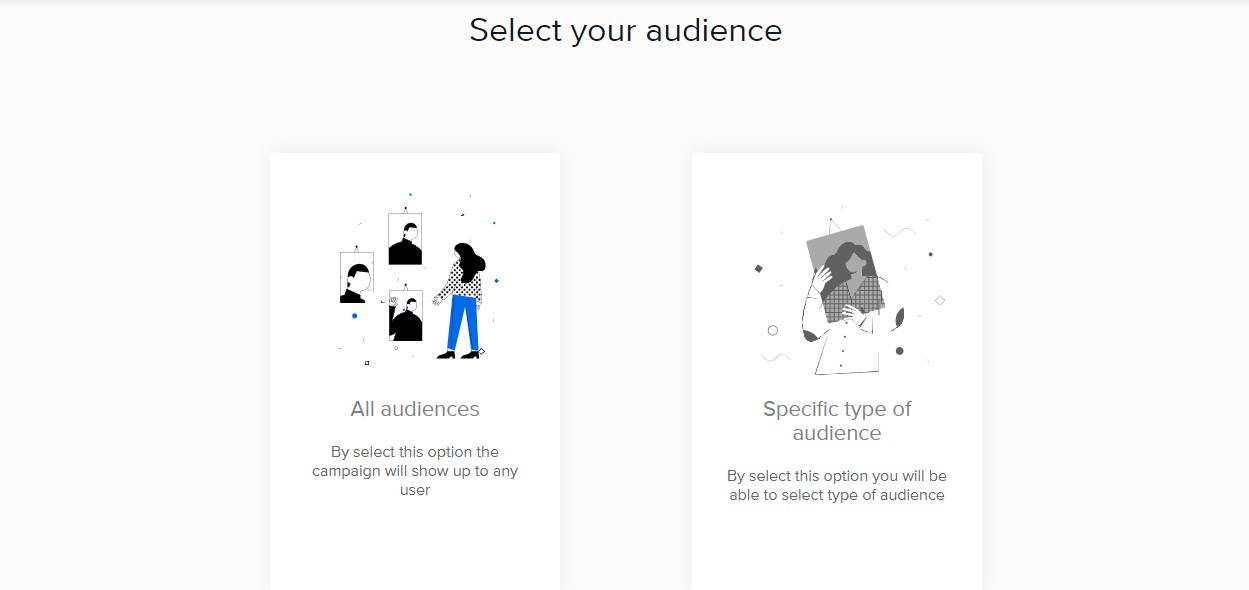
2. Create a Great Site Design
Having a well-designed, easy-to-navigate website can greatly improve your users’ experience. And people tend to engage more and better with websites that have a great user experience.
Thankfully, you don’t have to be a guru user experience designer to create a good-looking website.
WordPress, for example, has lots of pre-designed website templates you can use to create an elegant website. With these templates, creativity and design skills are not necessary.
Your job is to find the right template that suits your branding best.
3.Generate Great Content Ideas
One of the most effective ways to drive traffic to your blog is by creating content that attracts and keeps your audience wanting more.
But where do you look to for content ideas? Your passions, your readers’ interests, or trending topics (or a combination of all three).
Only make sure that your content is informative and not another collection of cookie-cutter posts that are all over the internet.
Stuck on content ideas? Just head over to Buzzsumo.com, type in a topic you would like to blog about. Email marketing, for example, is a good starting point.
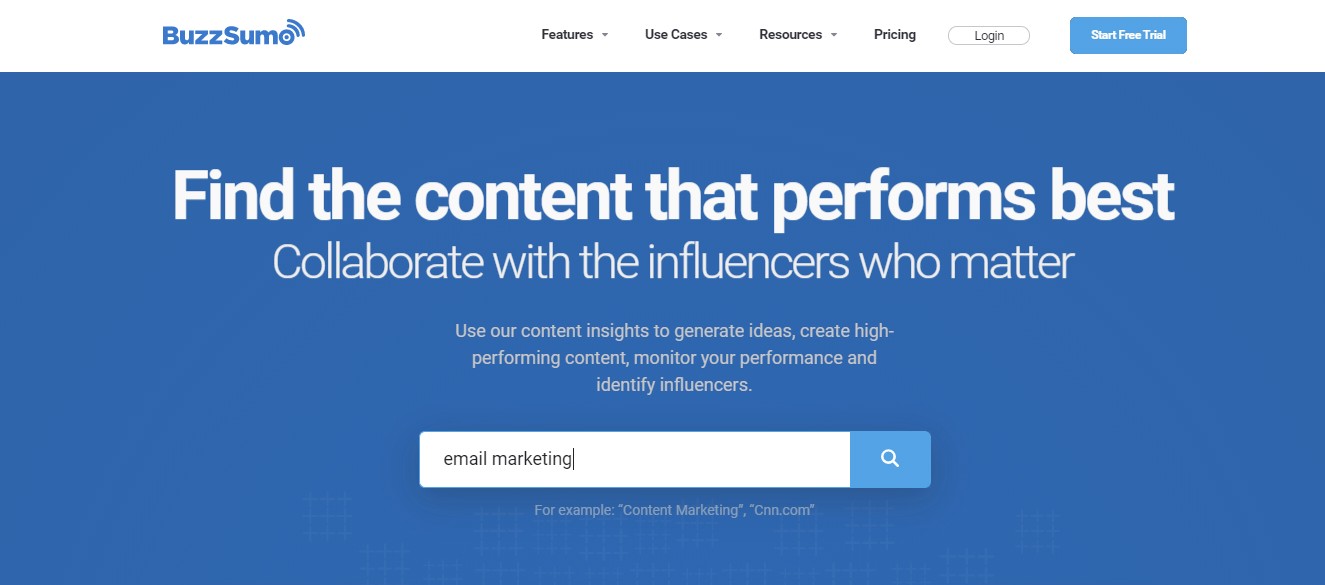
4. Write Engaging Headlines
Headlines greatly determine whether your published posts will succeed or fail.
They are the frontline element of a blog post potential readers will first engage with before deciding whether or not to click through.
Therefore, it is vital to write catchy headlines if you want to get clicks to your posts.
But don’t stop there; a great title must be matched by great content. Don’t let your readers down – if your post’s headline caught their attention they would definitely expect the post to live up to expectations.
Make sure that your work is detailed and valuable so that people are compelled to share it.
5. Optimize Your Posts for Search
When writing a post, ask yourself this: what phrases or keywords would your audience likely use to find your post on search engines like Google?
Of course, you don’t have to do all the figuring out by yourself – Google’s Keyword Planner can help.
Once you’ve found some meaningful keywords, incorporate them in the headline, content itself, URL, and, if possible, the images used in the blog post.
By doing this, you ensure the search engine finds your blog post quickly and recommends it to the potential audience, thus generating free traffic for your blog.
Also, consider using long-tail keywords. These are keywords or phrases that are longer, descriptive, and more specific. Although their search volume tends to be less than the regular keywords, they have a higher conversion value.
And since they are more specific, a visitor that finds your website via a long-tail keyword will most likely convert.
For example, let’s say you sell and write about your love for unique coffee mugs. Rather than using “coffee mugs” to describe your product, you could use “unique handmade ceramic coffee mugs.”
The words “coffee mugs” are common and popular, and because of the vastness of the internet, it would be difficult for potential customers to find your website.
Since the long-tail keyword is so specific, anyone searching for those words will likely buy your mugs once they come across your site.
One easy way to find long-tail keywords is by looking up related searches on Google.
For example, if you search for “long-tail keywords” and scroll down to the bottom of the search page, you will see this:

6. Be Consistent
The frequency at which you publish posts on your blog should be carefully thought out. Consistency doesn’t mean posting every day. It simply means coming up with a posting schedule and sticking to it.
By having a schedule that you adhere to, your readers know exactly when to expect new content.
7. Post Longer Articles
Research shows that long articles perform better than short articles.
This is because they give your readers deeper, concise information, unlike short blog posts.
8. Create Evergreen Content
Generating content that remains relevant over a long period of time will help you drive sustainable traffic to your blog. Evergreen content never goes out of date; it is not time-sensitive.
How do you generate evergreen content? Simply by paying attention to questions your target readers keep asking.
9. Use More Visuals
Humans tend to be visually inclined. That is to say, we get more attracted by images than text.
So, having a blog with images, gifs, and videos can increase the number of people visiting your site and retain their attention longer. For instance, a wedding website might use nice pictures of flowers to attract visitors and use enough visuals.
This is because graphic images reduce the monotony of texts and help your audience understand you without reading every single word.
10. Keep It Simple
An attractive blog should be simple and easy to read. You can keep your articles neat by using subheadings, numbered lists, and short paragraphs. Images, videos, and a limited color scheme would go a long way as well.
11. Make Your Site Load Faster
According to Neil Patel, a marketer and New York Times bestselling author, 40% of people abandon pages that take more than 3 seconds to load? Loading time has a significant influence on the traffic generated by your blog.
Reducing your blog’s loading time can be achieved through simple practices like reducing flash content, removing unnecessary ads, reducing the number of plugins, and using JPEG images instead of PNG. The faster your site loads, the better.
To check your site’s loading speed, head over to GTmetrix and plug in your website’s URL.
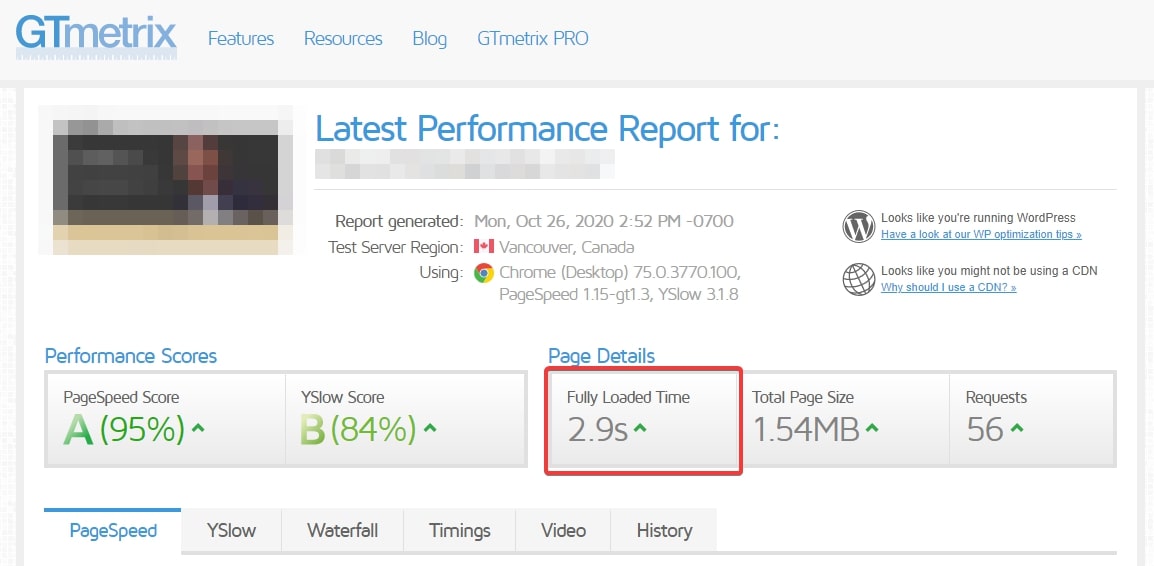
12. Include Internal Links
Linking to your previous posts is important. For one thing, it’s useful for SEO. Google loves it when you interlink your blog posts. Secondly, it helps to keep readers longer on your blog, and thus reduce your site’s bounce rate.
The links used, however, should be relevant and valuable. So, when creating your content, be sure to keep an eye out for opportunities to include internal links.
13. Invite Guest Contributors
Featuring other writers on your blog helps to add freshness to your blog. It’s a win-win for all parties involved.
They get exposure from your blog, and in turn, your workload is greatly reduced.
14. Guest Write on Other Blogs
It’s fine to have others contributing pieces to your blog; it wouldn’t hurt if you did the same.
Blogs which are in the same niche as yours are great places to market yourself by contributing as a guest host. This helps to create exposure for your blog.
And the more exposure you get for your blog, the more traffic you will get.
A lot of websites offer guest-writing opportunities to writers looking for exposure. One easy way to find one is by Googling up “write for us” – mind you, with the curly braces included.
As an illustration, here’s a guest-writing opportunity, courtesy of Sitepoint.

15. Promote Through Social Media
A quick and efficient way to increase your blog’s traffic is to ensure that you have an active social presence; this can be a personal or a business account.
Social media enables you to engage with potential readers. It also gives you an opportunity to nurture your blog’s followership.
We’d also suggest incorporating eye-catching, trendy, or funny captions under your social media posts to grab (and hold) your readers’ attention.
Adding hashtags to your posts can also extend your reach significantly. Plus, hashtags help to make your post more discoverable.
As much as you can, use social media to interact with your readers. Share links to each post you publish on your social media handles.
16. Encourage Social Sharing
Social media has become one of the fastest ways to spread information globally, so use this to your advantage. It is important to make it easy for people to share your content.
Add social sharing buttons to your posts and ask readers to share them. This is one easy, guaranteed hack to generate more traffic.
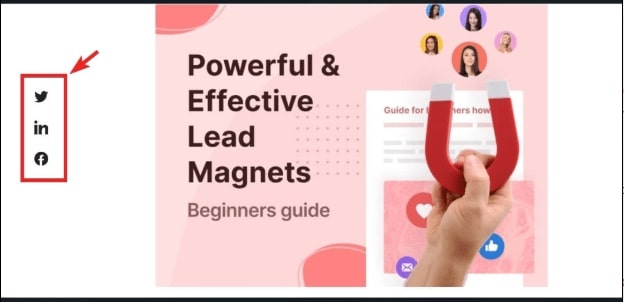
17. Build Backlinks to Your Blog
A backlink is a link to your website from another website.
But why bother?
Firstly, backlinks are an important ranking factor Google takes account of when deciding where to place your website on Search Engine Result Pages (SERPs). Blogs with a large number of backlinks from reputable websites often rank higher on SERPs.
Additionally, backlinks from reputable sites will increase trust in yours, meaning search engines will be more likely to recommend your website; this will lead to more eyes on your blog.
18. Promote Your Blog
Get your name out there. Don’t be afraid to promote your blog shamelessly.
Choose a platform that your target audience uses, like Instagram, and find a page that features similar content to yours and leave a comment about what your blog has to offer and why it’s relevant to their followers and their interests.
Those comments promoting your blog will easily convert to clicks that result in increased traffic.
Just be sure to limit comments to relevant pages and comment sections, do not spam unrelated websites with links.
19. Use Email Marketing
When trying to increase traffic, creating and growing your email list is a wonderful first step if you do not know where to begin.
Email marketing is a fantastic way to build a personal relationship with your subscribers. Decide which type of marketing campaign would work best for them and begin building your email list.
Once the list is ready, start marketing! You can find free email marketing tools online.
To perfect your email marketing campaign, you can integrate Adoric with all the major email marketing software providers. Adoric won’t just help you grow your mailing list, but it’ll convert visitors into customers and increase your sales.
With Adoric, you can be sure that you will not bombard your readers with an endless stream of emails about every single update on your blog but instead will inform (or remind) them of a new service or post when needed.
Adoric can help you boost your email list and get more subscribers as it is a one-stop solution for all of your marketing needs.
20. Ask For Help
Taking advantage of free promotions, like mentions by friends and family on their social media, is one of the easy ways to generate traffic.
Each time you publish a post, send the link to it to your friends and families and ask them to share. You’d be surprised at the volume of traffic this seemingly simple strategy can generate for you.
Asking friends, family, and even colleagues to share your post on their social media handles is word-of-mouth-marketing 101. And it works like a charm.
21. Host a Giveaway
Who doesn’t love giveaways? Creating opportunities where your audience can win gifts by subscribing, liking, commenting, and sharing your posts can help increase your blog’s traffic. It can also contribute to the growth of your readership.
Short on ideas? If you provide a service, for example, you can offer a free consultation to the winner.
22. Encourage Comments and Discussions
Giving thoughtful and detailed responses to the comments left by your readers creates trust and encourages them to keep leaving comments. Responding to comments signals to your readers that their contributions are welcomed.
As such, you would be encouraging them to read your post the more.
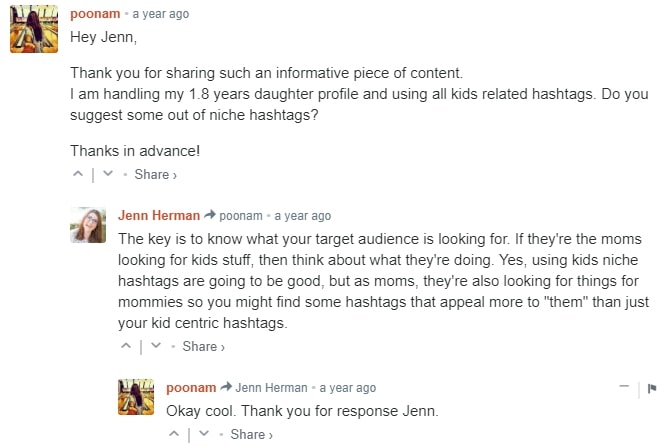
What’s more, Google loves it when a blog is receiving lots of comments. It’s indicative that such a blog is sharing good stuff – this means higher ranking.
23. Create a Forum on Your Website
Your readers may want to voice their opinions and share their perspectives about the topics you blog about. They may also have questions.
A forum allows them to not only connect with you but with each other too. If you sell a service or product, it will give your customers a place to leave a review. So, creating a forum will be a beneficial tool to increase traffic to your blog.
Creating an active forum on your site helps build a community of consistent readers and increase their time on the site.
This will go a long way in reducing your blog’s bounce rate.
Bounce rate represents the number of visitors who enter your site and then leave rather than stay to view or read the other material.
There’s another benefit of having an active forum: it provides you with loads of keyword-rich, user-generated content.
24. Become Active on Quora
Being active on a Question-and-answer platform like Quora can be beneficial. It helps to create the much needed exposure for your blog.
You can sign up for email updates on topics related to your blog’s content, provide brief and concise replies, and link to your site for a more comprehensive explanation.
Posting responses to questions asked and linking your blog posts as a reference will make it easy for people to know about your blog.
25. Update Your Old Content
Updating old posts helps to keep them relevant without any drop in the traffic they’re generating. One easy way to go about this is by swapping out outdated information for the new in the post.
The more helpful the content is, the higher it ranks in the search engine.
26. Be Authentic
Authenticity is very vital in content creation because it attracts like-minded people. It’s easy for your readers to notice when you are not yourself, which might put them off.
So, define your language, tone, values, and stick with them.
27. Go With What Works
It is essential to continually check your analytics, see what posts are doing well, and continue posting similar content.
Also, determine which platforms direct the most traffic to your blog and invest more time into using them. This information will let you know what works and what doesn’t, giving you insights on what to improve on and what to forego.
You want what you write and post to resonate with your readers, and monitoring what’s doing just that is a foolproof way to bring traffic to your website.
28. Create a YouTube Channel

YouTube is a great way to increase the visibility of your blog. If you have a product to sell, you can post tutorials on using it as well as your customers’ testimonials. You can also go live on the platform to promote your brand or a new blog post.
Your YouTube videos can also be shortened and reused on your social media platforms or in a blog post on your website.
29. Optimize for Mobile
Your website needs to be accessible on desktop as well as mobile devices. If your readers have difficulty viewing your content from their preferred device, they might exit your blog – possibly never to come back.
30. Interview the Experts
Identify people who are influencers or leaders in your industry and reach out to them. Many of them would be willing to speak with you because not only would it be a chance for them to share their knowledge, but it would provide more publicity for them.
You can publish the interviews on your blog and notify the interviewee once it’s posted.
They’ll most likely share the link to the interview with their friends, family, and followers, which would lead to, you guessed it, more traffic; it would also increase your credibility.
Conclusion
We have provided you with a comprehensive list of the best ways to drive more traffic to your blog or website.
We hope it helps!
Bear in mind that growing your blog’s traffic takes a lot of work, and so won’t happen overnight. The good news, thankfully, is that you can successfully pull this off by using strategies we’ve shared with you.
Already driving meaningful traffic to your blog but finding it hard to convert visitors to subscribers?
Why not sign up for a free account with Adoric, and watch your mailing list grow by leaps and bounds.



